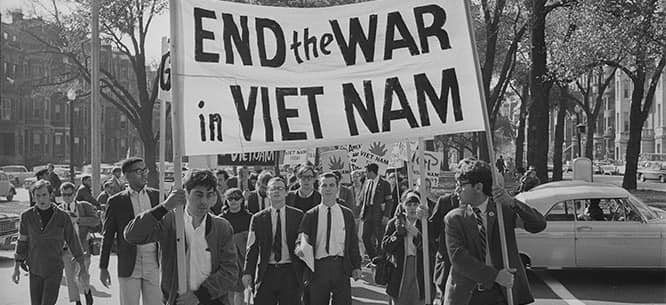
Protestors in Boston, 1965; AP/Frank C. Curtin
Universities under siege over the Gaza war bring it all back for us Vietnam-era college-educated boomers. Back then, you could be for Vietnamese self-determination, the U.S. minding its own business, or the victory of communist North Vietnam and the Viet Cong. You could have been for all three, or two out of three, but most people had a #1. Coming out and saying what you wanted made for better arguments in the dorm or campus teach-ins. There were actually a lot of people who were for the communists winning, in Vietnam and elsewhere. As my old boss Richard Nixon used to say, the left vs. right dynamic is eternal, and during the antiwar movement, after a generation of U.S. blunders, ideological lines had hardened.
In our time, protesting over Gaza, we can be against the Netanyahu regime and its brutal insurgency, against Zionism, or for Hamas. Again, we can take more than one position, but most protesters probably have a favorite of the three, and if they do, it would be good to say so. Questioning Israel’s tactics is the least showy choice. In this, you would agree with President Biden and even elements of the Israeli military.
Once considered an extreme position, being against Zionism is on the verge of going mainstream. That means you don’t believe Israel has the right to exist as a Jewish nation. It may be because you don’t like countries defined by ethnicity or religion, in which case you are presumably against the existence a number of Muslim and uniformly ethnic countries as well. It could be because you think Israel has failed at the self-imposed challenge of being Jewish and democratic. The 57-year-long military occupation of the West Bank is compelling evidence. Yet using that metric means you are against a lot of nondemocratic countries that persecute internal minorities, such as China. Or you may think Israel is a white colonial power oppressing indigenous people of color. But that argument stalls when we remember that many if not most Israeli Jews are people of color and that virtually all their ancestors originally came from Palestine — until they were expelled by a white European colonial regime known as the Roman Empire..
Either way, your position is likely to be experienced as a mortal challenge by all those who still believe in Israel, especially most Israelis, who love their country notwithstanding its imperfections. Unless we’re antisemitic, it’s unfair to equate anti-Zionism with antisemitism. But since Israel isn’t going anywhere, it is impractical to be anti-Zionist, especially if we at the same time are promoting Palestinian self-determination. Palestine would be a predominantly Arab Muslim country, and remember, you’re anti-Zionist, so you’re against that kind of thing.
As for being for Hamas, that means you support a nihilistic movement willing to sacrifice innocent Israelis and Gazans alike in order to accomplish its genocidal program against Israel. A ruthless guerrilla army, its tentacles wrapped around civilians and civilian institutions, it wants more Gazans to die, to stoke anger at Israel. Being for Hamas is a far more extreme position than being for the Viet Cong in Vietnam. It’s kind of like being for the Khmer Rouge in Cambodia, who killed at least two million people after taking power in 1975. Revolutionaries do things like that all the time after they win. So I would think hard before holding up a Hamas sign on a sunny afternoon on a college campus, one of the safest places in the world.
So what do I think? If I were a USC student, I might actually be out there with the protestors, but my sign would probably say “Feed Gaza / No Siege of Rafah.” If I’d marched in 1968, my sign would’ve said “Most U.S. Troops Home Now / Honest Saigon Elections Now.” Pretty tepid, I realize. But there’s enough hot water in the world as it is.
